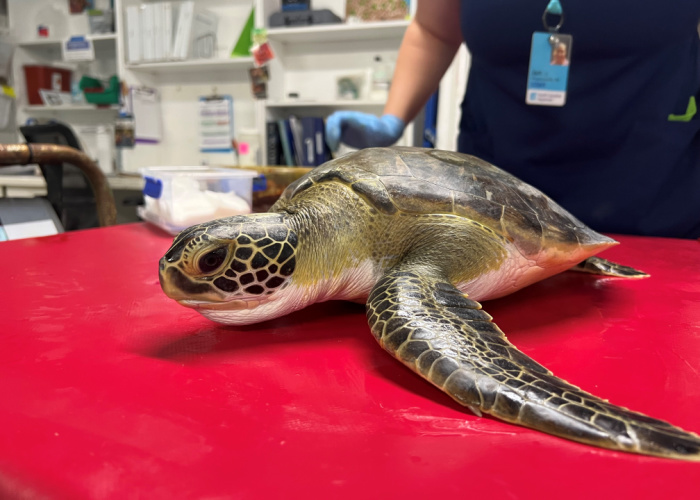Green (Chelonia mydas)
Stranding Location: Kiawah Island, SC
Arrival Date: 8/29/23
Age: Juvenile
Sex: Unknown
Weight: 3.77 kg (8.31 lbs)
Case History
Waterloo was reported to the South Carolina Department of Natural Resources (SCDNR) by a beachgoer who found the turtle stranded on the beach above the high tide line. SCDNR dispatched the Kiawah Turtle Team to retrieve the juvenile green turtle for transport to the South Carolina Aquarium Sea Turtle Care Center™ for examination and treatment.
Treatment
Waterloo arrived fairly active and in decent body condition. Radiographs revealed lung symmetry and normal GI tract function. Upon physical examination, it looked like Waterloo might have recently been involved in a predator encounter, such as a shark. S/he had small, superficial rake marks on the left mid-side of the carapace (top shell) and a few rake marks and abrasions on the plastron (belly shell). The patient was given fluids, vitamins and antibiotics and was cleared to be tested in a full tank of water. Once placed in the tank, Waterloo took to the water easily and exhibited a calm demeanor, smooth breaths and was able to rest on the bottom. Within 15 minutes of being in the new tank, s/he started defecating sea grass and was clearly settling in.
Updates
The next day, Waterloo was active and bright. Staff offered a couple pieces of fish to test this patient’s appetite and s/he ate them immediately. So far, things are looking good for this young turtle.
September 15, 2023: Waterloo has been eating quickly and consistently and defecating lots of seagrass! In the wild, green sea turtles naturally eat seagrass and algae. As juveniles, they will eat a combination of seagrass and protein. Once they become fully grown adults, they will fully switch to consuming vegetation only. It’s great to see that Waterloo was eating the veggies early on, and s/he seems to appreciate our substitution of romaine lettuce and zucchini.
October 15, 2023: Waterloo has made great strides this past month! S/he finished with antibiotics and we have seen progress in the healing of the rake marks and abrasions on Waterloo’s plastron.
November 15, 2023: Waterloo continues to make great strides in healing but has started to become a picky eater. S/he will eat vegetables like squash, zucchini, bell peppers and more, but will occasionally be picky about eating lettuce. Specifically, Waterloo refuses to eat any lettuce that floats on the surface of the water. We repeatedly use PVC feeders to sink the lettuce to the bottom of the tank and this has been helping!
December 15, 2023: We figured out that Waterloo does not like the red tops of red leaf lettuce, but will happily chow down on all other diet items offered. Waterloo is currently shedding some keratin. As sea turtles grow, they shed the keratin that covers their shells and skin. When the keratin sheds, the scutes (scales) beneath are lighter in color. This is a natural occurrence and the enrichment in Waterloo’s tank will allow for the keratin to be more naturally removed. We often times find this little green scratching away just like s/he would in the wild!
January 15, 2024: This past month, Waterloo has enjoyed exploring many different enrichment items! S/he has received a headtube, backscratcher, hula hoop and sea grass. Currently, the backscratcher seems to be the favorite as we can often find Waterloo scratching against it!
February 15, 2024: Waterloo has been a model patient these past few months! Waterloo was tagged earlier this month and we are awaiting bloodwork results to determine if this little green will be cleared for release!
February 26, 2024: Today Waterloo made a trip to Florida’s warmer waters and was successfully released at Little Talbot Island State Park along with nine other rehabilitated patients! Wish Waterloo the best of luck out in the big blue!


